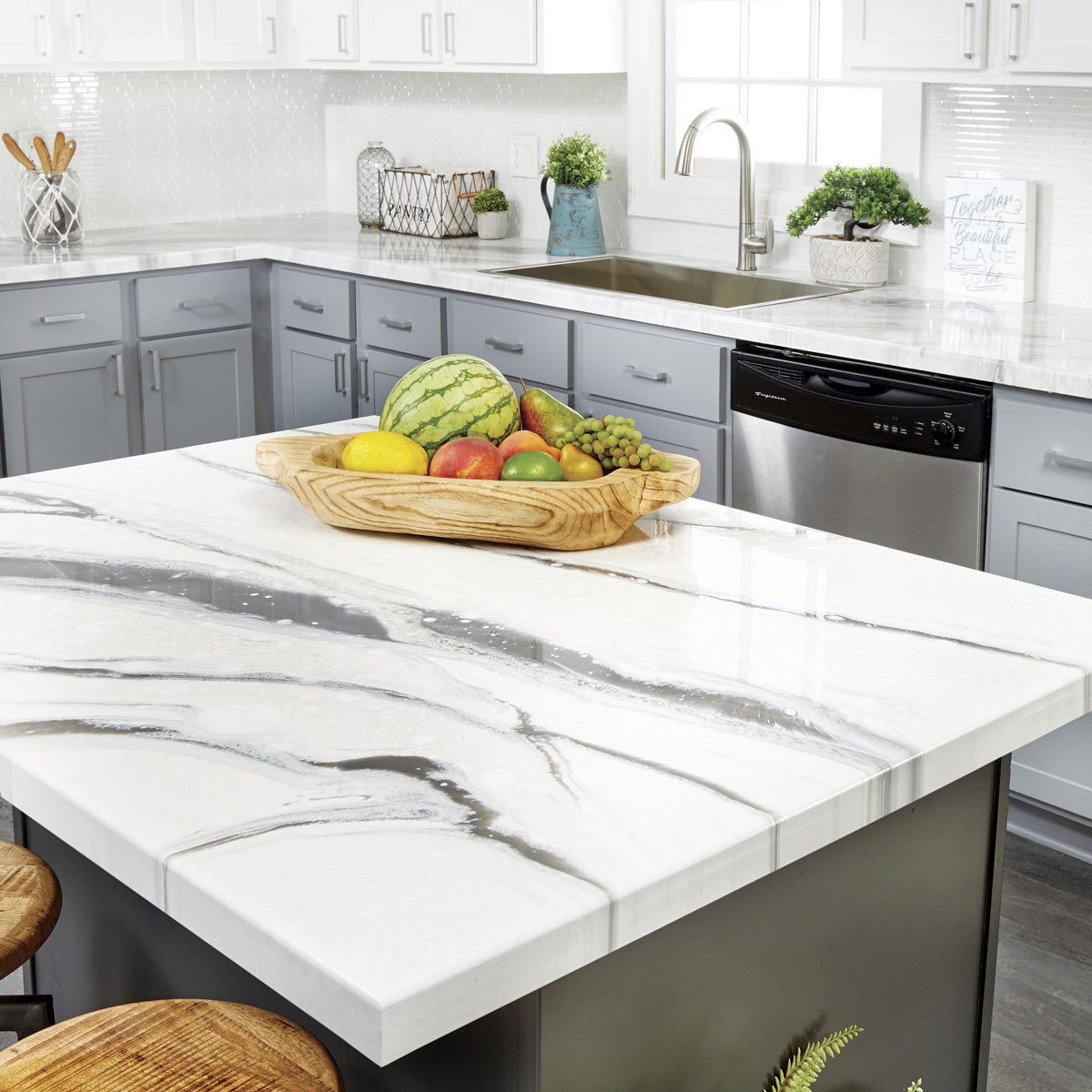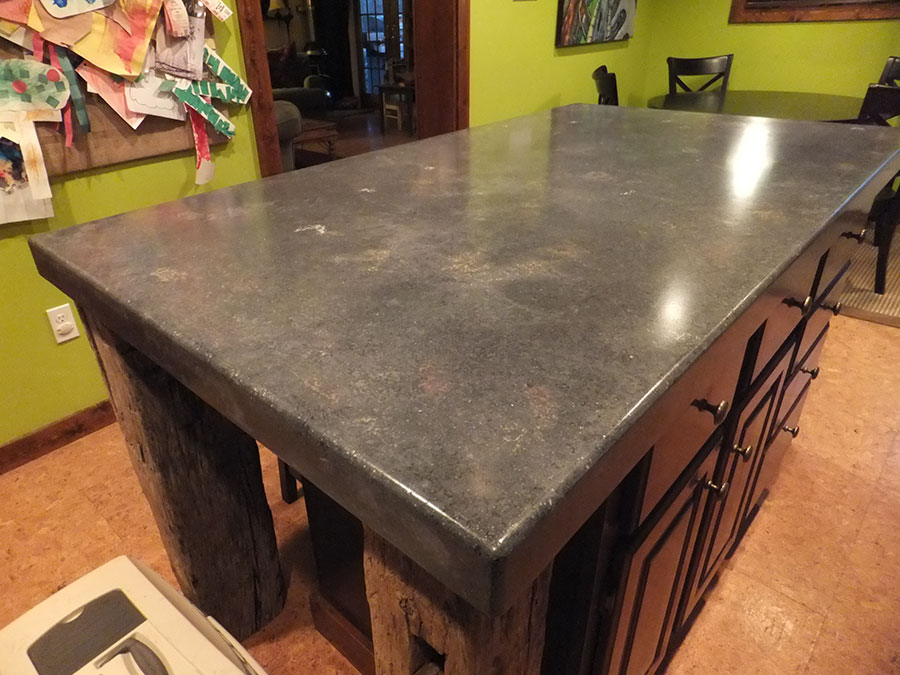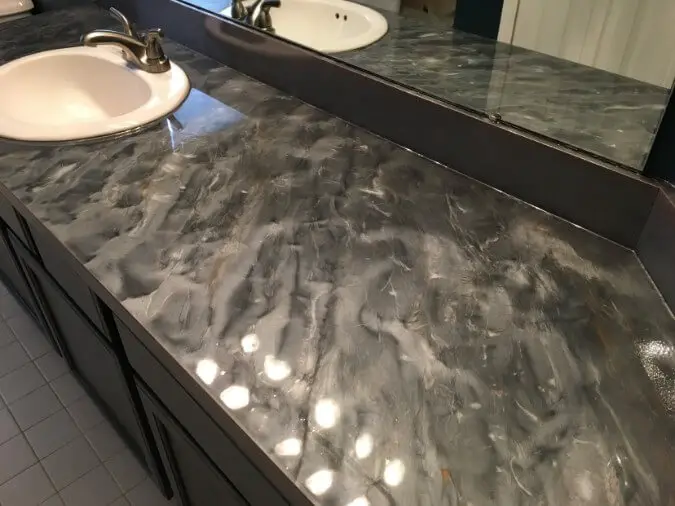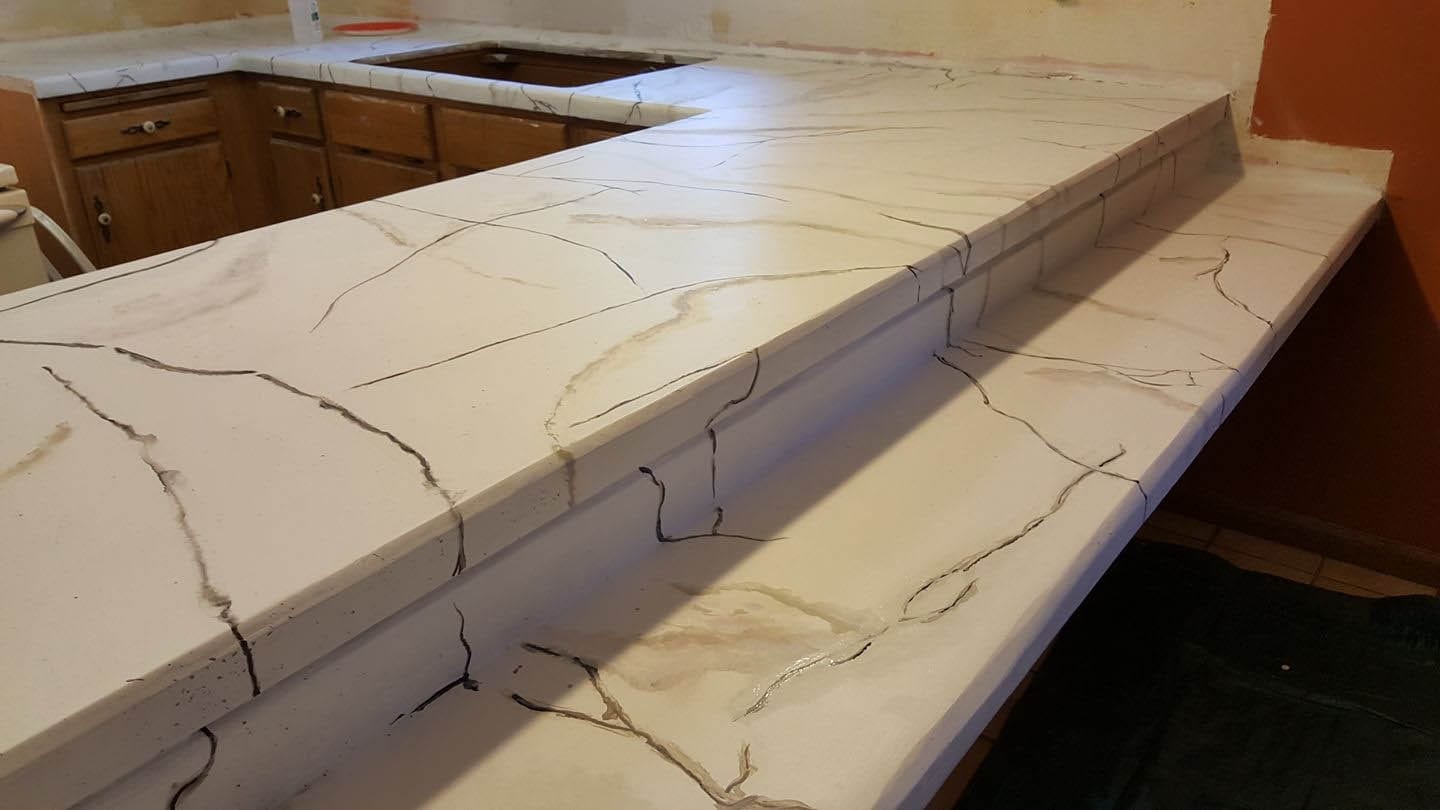Epoxy on concrete countertops is becoming increasingly popular for its unique combination of durability, style, and versatility. Epoxy provides a high-gloss, smooth finish that enhances the natural beauty of concrete while protecting it from stains, spills, and damage. Concrete countertops on their own are porous, which makes them vulnerable to staining, especially in a busy kitchen or bathroom environment.
Adding an epoxy coating not only seals the surface but also transforms it into a glossy, resilient finish that mimics natural stone or polished glass. Whether you’re looking for a sleek, modern look or something more industrial, epoxy can be customized to fit any design aesthetic, giving concrete countertops a distinctive edge over other materials.
Epoxy is also highly customizable, which makes it an excellent choice for homeowners who want to add personal flair to their countertops. Epoxy resins are available in a wide range of colors, and they can be mixed with pigments, metallic powders, or even glitter to create eye-catching effects. This means you can tailor the epoxy finish to match the color scheme of your kitchen or bathroom or create a unique countertop with a marbleized effect or intricate patterns. Epoxy also provides a seamless finish that covers any imperfections or irregularities in the concrete, enhancing the overall look of the countertop.
One of the biggest benefits of epoxy-coated concrete countertops is the durability of the finish. Once cured, epoxy creates a hard, non-porous surface that resists scratching, chipping, and staining. This makes it ideal for high-traffic areas like kitchens where countertops see heavy use. Epoxy is also highly resistant to chemical damage, so you don’t have to worry about stains from acidic foods or harsh cleaning agents. For those who love to cook, this added durability can provide peace of mind that their countertop will hold up well over time, even with regular wear and tear.

Maintenance of epoxy-coated concrete countertops is relatively simple, though it requires some attention to ensure the finish stays glossy and smooth. Because epoxy forms a seamless, non-porous layer, it’s easy to clean up spills and messes with a damp cloth or mild soap. This ease of cleaning is one of the reasons epoxy-coated surfaces are popular in busy kitchens and bathrooms. Unlike natural stone or wood, epoxy doesn’t require special cleaners, so it’s easy to maintain without a lot of added expense. However, abrasive sponges or cleaners should be avoided, as they can dull the finish over time.
For those who enjoy DIY projects, applying epoxy on a concrete countertop can be a fun yet challenging undertaking. While it’s possible to achieve a professional-quality finish on your own, it requires a lot of preparation and attention to detail. The concrete surface needs to be thoroughly cleaned and dried before the epoxy is applied, and it’s important to mix the epoxy correctly to avoid bubbles or uneven textures. Temperature and humidity can also impact the curing process, so these factors need to be monitored closely. Many DIY enthusiasts find the process rewarding, especially when they achieve a beautiful, customized finish that adds a personal touch to their space.
Applying epoxy to concrete countertops offers a range of design possibilities, from solid colors to translucent finishes that allow the natural texture of the concrete to show through. Layering techniques can create depth and dimension, making the countertop a striking focal point in the kitchen or bathroom. The versatility of epoxy extends to various design trends, whether you’re going for a modern, minimalist look or a bold, artistic statement. The ability to experiment with different techniques, colors, and effects is one of the reasons epoxy-coated concrete countertops appeal to creative homeowners.

However, it’s important to recognize that epoxy does have some limitations. While it’s highly durable, epoxy can be susceptible to scratches and can yellow over time if exposed to direct sunlight. This means it’s best suited for indoor applications where UV exposure is limited. If you have large windows that let in a lot of natural light, you may want to consider a UV-resistant epoxy or place the countertop away from direct sunlight to prevent discoloration. Regular maintenance can help minimize the appearance of scratches, but it’s essential to avoid using the surface as a cutting board.
Epoxy-coated countertops also have a distinctive look that may not appeal to everyone. The glossy, high-shine finish is perfect for modern spaces, but may feel too flashy in rustic or farmhouse-style kitchens. That said, the versatility of epoxy can still work in a wide range of aesthetics if paired thoughtfully with other materials, like wood or stainless steel. Choosing the right color and finish for the epoxy is crucial for creating a look that complements the rest of the kitchen or bathroom decor.
In terms of cost, epoxy on concrete countertops can be a relatively affordable way to achieve a luxurious look. While custom epoxy finishes can be more expensive, basic epoxy applications are generally budget-friendly compared to granite or quartz. DIY applications can further reduce the cost, as professional installation fees are typically high. Homeowners who want a custom, high-end appearance without the price tag of natural stone often turn to epoxy as an alternative, as it offers the same glossy effect for a fraction of the cost.

A significant advantage of epoxy-coated concrete countertops is their longevity when properly maintained. Unlike some materials that require frequent resealing, epoxy forms a permanent bond with the concrete, creating a lasting finish. With regular cleaning and mindful use, epoxy-coated surfaces can maintain their high-gloss finish for many years. This makes it a smart investment for homeowners looking to add lasting value to their kitchens or bathrooms.
Concrete countertops with epoxy coating also have the benefit of being resistant to water and moisture damage, a common issue with other materials. In humid environments, wood countertops can warp and laminate can bubble, but epoxy’s non-porous surface provides an effective barrier against water. This quality is particularly beneficial in bathrooms or near sinks where water exposure is frequent. Epoxy-coated concrete can withstand these conditions without compromising the appearance or functionality of the countertop.
Installing an epoxy finish on a concrete countertop is also an eco-friendly choice, as it reduces the need for replacing or disposing of materials. Concrete itself is a sustainable material, often made from locally-sourced resources. The epoxy coating extends the life of the concrete, minimizing waste and reducing the environmental impact over time. This is particularly appealing to homeowners interested in sustainable design, as they can achieve a durable, stylish finish without the need for frequent replacements.

Epoxy can also protect the underlying concrete from stains and discoloration, especially from acidic or strongly pigmented foods. This is a valuable feature in the kitchen, where foods like tomatoes, berries, and wine can easily stain porous materials. Epoxy’s non-porous nature creates a barrier, allowing you to prepare food without worrying about permanent marks. However, spills should still be wiped up promptly, as acidic substances can potentially degrade the epoxy finish if left for long periods.
Another benefit of epoxy on concrete countertops is that it can make the surface heat-resistant to an extent. While it’s not entirely heat-proof, epoxy can handle brief contact with hot items, such as plates or serving dishes. However, it’s still recommended to use trivets or hot pads for items directly out of the oven or stove. The epoxy’s heat resistance depends on the quality of the product used, so it’s important to choose a reputable brand to ensure it can withstand typical kitchen temperatures.
Epoxy on concrete countertops provides a durable, customizable, and stylish solution for homeowners seeking a unique countertop material. Its resistance to water, stains, and scratches makes it practical for kitchens and bathrooms alike, while its range of design options allows for personal expression. Although there are some considerations, such as UV sensitivity and maintenance, epoxy is an excellent choice for anyone looking to elevate the look of their concrete countertops.

Common Mistakes to Avoid
Skipping Surface Preparation: Preparing the concrete surface is crucial. If the concrete isn’t thoroughly cleaned and dried, the epoxy may not bond properly, leading to peeling or bubbling over time. Ensure all dust and debris are removed before applying the epoxy.
Applying Epoxy in High Humidity: Epoxy curing can be affected by high humidity, which may cause the finish to become cloudy. Aim to apply epoxy in a controlled environment with low humidity to achieve a clear, smooth finish.
Using Abrasive Cleaners: Epoxy is durable but can scratch if abrasive cleaners are used. Opt for mild soap and water, and use a soft cloth for regular cleaning to keep the surface glossy and free of micro-scratches.
Exposing Epoxy to Direct Sunlight: Over time, direct sunlight can cause epoxy to yellow. If your countertop is near a window, consider installing UV-blocking film or shades to reduce exposure and maintain the finish.
Ignoring Safety Precautions: Epoxy application involves chemicals that emit strong fumes during curing. Make sure the area is well-ventilated and consider wearing a mask and gloves to protect yourself during application.

How long does epoxy on a concrete countertop last?
When properly applied and maintained, epoxy-coated concrete countertops can last for many years. Regular cleaning and avoiding harsh treatments will help maintain the glossy finish, allowing the countertop to retain its beauty and durability for a long time.
Can I apply epoxy on my concrete countertop myself?
Yes, many people choose to DIY epoxy application on concrete countertops. However, it’s essential to follow instructions carefully, especially regarding mixing and curing. Preparation is key, as the concrete surface must be clean and dry for the epoxy to bond properly.
Is epoxy food-safe for kitchen countertops?
Once fully cured, most epoxies are food-safe, creating a non-porous barrier that prevents bacteria growth. It’s still best to check the manufacturer’s label to ensure the product you’re using is certified food-safe, especially if the surface will come into contact with food.

Can I use my epoxy-coated countertop as a cutting surface?
No, using epoxy-coated countertops as a cutting surface can cause scratches and damage. It’s best to use a cutting board to preserve the integrity of the finish and prevent unsightly marks that are difficult to repair.
What’s the best way to clean an epoxy-coated concrete countertop?
The best method is using mild soap and water with a soft cloth. Avoid harsh chemicals or abrasive pads, as they can damage the surface. Regular cleaning with a gentle approach will help maintain the countertop’s glossy finish.
Will epoxy turn yellow over time?
Yes, epoxy can yellow over time, especially if exposed to direct sunlight. To prevent this, use UV-resistant epoxy products and consider limiting the countertop’s exposure to direct sunlight to keep it looking fresh and clear for longer.

How to Make Concrete Countertops Look Like Marble Direct Colors

Related articles:
- Outdoor Concrete Countertops
- How To Make Concrete Countertops Smooth
- Rustic Concrete Countertops
- Farmhouse Concrete Countertops
- Concrete Countertops Outdoor Kitchen
- How To Stain Concrete Countertops
- DIY Concrete Countertop Mix
- Concrete Countertops Made Easy
- Concrete Countertop Overlay
- Black Concrete Countertops